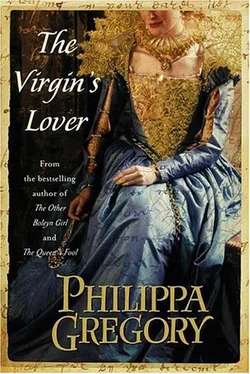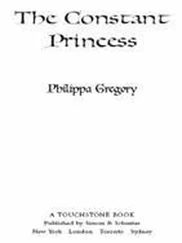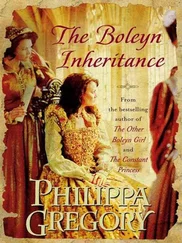He knew it was Robert Dudley’s. Robert Dudley, of course; who stood back by the window, leaning against the shutter, looking down into the midsummer garden, and sniffed a pomander held to his nose with one slim white hand. Now and again he would shift his position, or breathe in lightly, or clear his throat, and at once the queen would break off and turn, as if to give way to him. If Robert Dudley had so much as a passing thought she assumed they would all be eager to hear it.
She adores him, Cecil thought, hardly hearing the detail of the queen’s complaints. She is in her first flush of love, and he is the first love of her womanhood. She thinks the sun shines from his eyes, his opinions are the only wisdom she can hear, his voice the only speech, his smile her only pleasure. It is pointless to complain, it is pointless to be angry with her folly. She is a young woman in the madness of first love and it is hopeless expecting her to exercise any kind of sensible judgment.
The third meeting, Cecil found the queen alone but for Sir Nicholas Bacon and two ladies in attendance. “Sir Robert has been delayed,” she said.
“Let us start without him,” Sir Nicholas smoothly suggested. “Lord Secretary, you were going through the terms of the treaty, and the detail of the French withdrawal.”
Cecil nodded and put his papers before them. For the first time the queen did not spring to her feet and stride away from the table, railing against him. She kept her seat and she looked carefully at the proposal for the French withdrawal.
Emboldened, Cecil ran through the terms of the treaty again, and then sat back in his chair.
“And do you really think it is a binding peace?” Elizabeth asked.
For a moment, it was as it had always been between the two of them. The young woman looked to the older man for his advice, trusting that he would serve her with absolute fidelity. The older man looked down into the little face of his pupil and saw her wisdom and her ability. Cecil had a sense of the world returning to its proper axis, of the stars recoiling to their courses, of the faint harmony of the spheres, of homecoming.
“I do,” he said. “They were much alarmed by the Protestant uprising in Paris, they will not want to risk any other ventures for now. They fear the rise of the Huguenots, they fear your influence. They believe that you will defend Protestants wherever they are, as you did in Scotland, and they think that Protestants will look to you. They will want to keep the peace, I am sure. And Mary, Queen of Scots, will not take up her inheritance in Scotland while she can live in Paris. She will put in another regent and command him to deal fairly with the Scots lords, according to the terms of the peace contract. They will keep Scotland in name only.”
“And Calais?” the queen demanded jealously.
“Calais is, and always has been, a separate issue,” he said steadily. “As we have all always known. But I think we should demand it back under the terms of the treaty of Cateau-Cambrésis, when their lease falls due, as agreed. And they are more likely to honor the agreement now than before. They have learned to fear us. We have surprised them, Your Grace; they did not think we had the resolve. They will not laugh at us again. They certainly will not lightly make war on you again.”
She nodded, and pushed the treaty toward him. “Good,” she said shortly. “You swear it was the very best you could do?”
“I was pleased to get so much.”
She nodded. “Thank God we are free from the threat of them. I wouldn’t like to go through this past year again.”
“Nor I,” said Sir Nicholas fervently. “It was a great gamble when you took us into war, Your Majesty. A brilliant decision.”
Elizabeth had the grace to smile at Cecil. “I was very brave and very determined,” she said, twinkling at him. “Don’t you think so, Spirit?”
“I am sure that if England ever again faces such an enemy, you will remember this time,” he said. “You will have learned what to do for the next time. You have learned how to play the king.”
“Mary never did so much,” she reminded him. “She never had to face an invasion from a foreign power.”
“No, indeed,” he agreed. “Her mettle was not tested as yours has been. And you were tested and not found wanting. You were your father’s daughter and you have earned the peace.”
She rose from the table. “I can’t think what is keeping Sir Robert,” she complained. “He promised me he would be here an hour ago. He has a new delivery of Barbary horses and he had to be there to see them arrive in case they had to be sent back. But he promised me he would come at once.”
“Shall we walk down to the stables to meet him?” Cecil suggested.
“Yes,” she said eagerly. She took his arm and they walked side by side, as they had walked so often before.
“Let’s take a turn in the garden first,” he suggested. “The roses have been wonderful this year. D’you know, Scotland is a full month behind in the garden?”
“Is it very cold and barbaric?” she asked. “I wish I could see it.”
“You could go on progress to Newcastle one summer,” he said. “They would be glad to see you there, and it would be good policy to visit the border castles.”
“I should like to,” Elizabeth said. “You must have ridden your horses into the ground. You went backward and forward from Edinburgh to Newcastle, didn’t you?”
Cecil nodded. “I wanted to confer with your uncle, and I needed to keep an eye on Monsieur Randan. It was a hard ride and a poorly kept road, especially in Scotland.”
She nodded.
“And what of you?” Cecil lowered his voice. The ladies walking behind them were out of earshot; Sir Nicholas was walking with Catherine Knollys. “How have things been with you these last two months, Princess?”
For a moment he thought she would turn the question aside with a laugh, but she checked herself. “I was very afraid,” she said honestly. “Kat thought that my health would break under the strain.”
“That was my fear,” he said. “You bore up wonderfully.”
“I couldn’t have done it without Sir Robert,” she said. “He can always calm me, Spirit. He has such a wonderful voice, and his hands …I think he has magic in his hands …it’s why he can do anything with his horses. As soon as he lays his hand on my forehead I feel at peace.”
“You are in love with him,” he said gently.
Elizabeth looked quickly up at him to see if he was accusing her; but he met her eyes with steady sympathy.
“Yes,” she said frankly, and it was a relief to her to be able to tell her counselor the truth at last. “Yes, I am.”
“And he with you?”
She smiled. “Yes, oh yes. Think of the misery if he was not!”
He paused, then he asked her: “Princess, what will come of this? He is a married man.”
“His wife is ill, and could die,” Elizabeth said. “And anyway, they have been unhappy for years. He says that his marriage is no more. She will release him. I can grant them a divorce. Then he will marry me.”
How to deal with this? She will not want wise counsel; she will want to be confirmed in this folly. But if I do not speak, who will? Cecil drew a breath. “My queen, Amy Dudley, Amy Robsart that was, is a young woman; there is no reason to think that she will die. You cannot delay your marriage waiting for a young woman to die. And you cannot possibly grant him a divorce; there are no grounds for a divorce. You danced at his wedding feast yourself, when they married for love with the blessing of their parents. And you cannot marry a commoner, a man whose family has been under the shadow of treason, a man with a living wife.”
Читать дальше
Конец ознакомительного отрывка
Купить книгу












